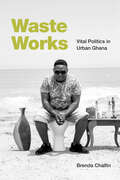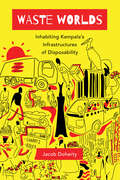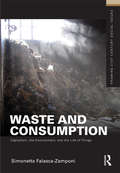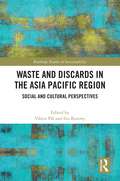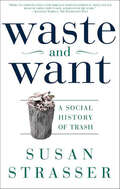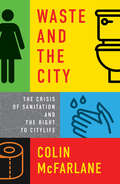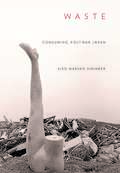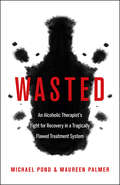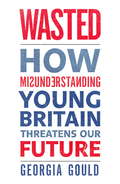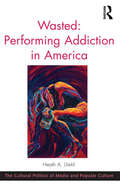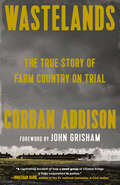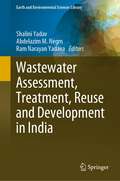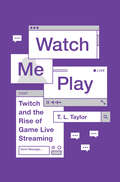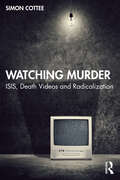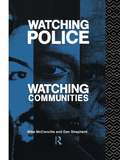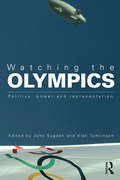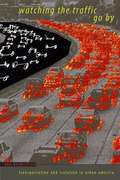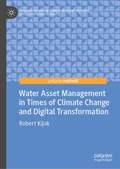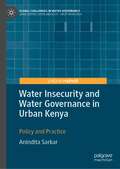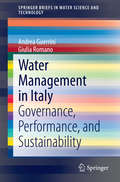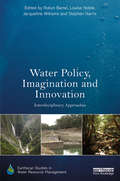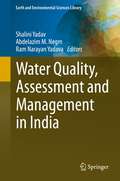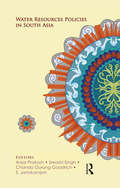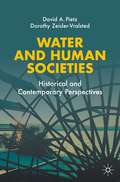- Table View
- List View
Waste Works: Vital Politics in Urban Ghana
by Brenda ChalfinIn Waste Works, Brenda Chalfin examines Ghana’s planned city of Tema, theorizing about the formative role of waste infrastructure in urban politics and public life. Chalfin argues that at Tema’s midcentury founding, a prime objective of governing authorities was to cultivate self-contained citizens by means of tightly orchestrated domestic infrastructure and centralized control of bodily excrement to both develop and depoliticize the new nation. Comparing infrastructural innovations across the city, Chalfin excavates how Tema residents pursue novel approaches to urban waste and sanitation built on the ruins of the inherited order, profoundly altering the urban public sphere. Once decreed a private matter to be guaranteed by state authorities, excrement becomes a public issue, collectively managed by private persons. Pushing self-care into public space and extending domestic responsibility for public well-being and bodily outputs, popularly devised waste infrastructures are a decisive arena to make claims, build coalitions, and cultivate status. Confounding high-modernist ideals, excremental infrastructures unlock bodily waste’s diverse political potentials.
Waste Worlds: Inhabiting Kampala's Infrastructures of Disposability (Atelier: Ethnographic Inquiry in the Twenty-First Century #6)
by Jacob DohertyUganda's capital, Kampala, is undergoing dramatic urban transformations as its new technocratic government seeks to clean and green the city. Waste Worlds tracks the dynamics of development and disposability unfolding amid struggles over who and what belong in the new Kampala. Garbage materializes these struggles. In the densely inhabited social infrastructures in and around the city's waste streams, people, places, and things become disposable but conditions of disposability are also challenged and undone. Drawing on years of ethnographic research, Jacob Doherty illustrates how waste makes worlds, offering the key intervention that disposability is best understood not existentially, as a condition of social exclusion, but infrastructurally, as a form of injurious social inclusion.
Waste and Consumption: Capitalism, the Environment, and the Life of Things (Framing 21st Century Social Issues)
by Simonetta Falasca-ZamponiThis book examines the link between waste and consumption through a cultural approach that integrates environmental concerns with reflections on the role that consumption has come to occupy in our contemporary capitalist societies. The mutual relationship between capitalism and consumption is addressed along with early critiques of industrialization that exposed environmental problems. Toxic waste and its illegal dumping are examined, along with the problem of abuse of poorere areas and nations when it comes to disposing of toxic material. The question of solutions to the problems created by consumption and waste is raised and the claim is advanced that we do not necessarily need to stop being consumers. This timely book can be used in introductory sociology, social problems, and classes on environment and sustainability. This book is part of the Framing 21st Century Social Issues Series which offers readable, teachable "thinking frames" on today's social problems and social issues by leading scholars, all in short 60 page or shorter formats, and available for view on http://routledge.customgateway.com/routledge-social-issues.html. For instructors teaching a wide range of courses in the social sciences, the Routledge Social Issues Collection now offers the best of both worlds: originally written short texts that provide "overviews" to important social issues as well as teachable excerpts from larger works previously published by Routledge and other presses.
Waste and Discards in the Asia Pacific Region: Social and Cultural Perspectives (Routledge Studies in Sustainability)
by Viktor Pál Iris BorowyThis book uncovers, explores and analyses the cultural and social factors and values that lie behind waste making, recycling and disposal in the Asia Pacific region, where impressive economic growth has led to significant increases in production, consumption and concomitant waste production. This volume demonstrates the immense scope of waste as a multi-sectoral phenomenon, covering discussions on food, menstrual products, sewage, electronics, scrap, nuclear waste, plastics, and even entire villages as they are submerged underwater by dam building, considered expendable in favour of economic growth. It discusses the wide range of approaches and contexts through which people interact with waste, including socio-economic analysis, participatory observation, laboratory science, art, video, installations, literature and photography. Case studies focusing on India, China and Japan, in addition to other regional examples, demonstrate the ubiquity of waste, materially and geographically. It examines the duality of waste management, fostering community building while simultaneously excluding marginalised groups; how it can be linked to efforts creating circular economies, to then reappear in oceanic garbage patches; or technical waste repurposed for high-tech laboratory research before being discarded once again. This timely and wide-ranging collection of essays will be an important read for scholars, researchers and students in sustainability, development studies, discard studies, and social and cultural history, particularly focusing on countries in the Asia-Pacific.
Waste and Want: A Social History of Trash
by Susan StrasserAn unprecedented look at that most commonplace act of everyday life--throwing things out--and how it has transformed American society.Susan Strasser's pathbreaking histories of housework and the rise of the mass market have become classics in the literature of consumer culture. Here she turns to an essential but neglected part of that culture--the trash it produces--and finds in it an unexpected wealth of meaning. Before the twentieth century, streets and bodies stank, but trash was nearly nonexistent. With goods and money scarce, almost everything was reused. Strasser paints a vivid picture of an America where scavenger pigs roamed the streets, swill children collected kitchen garbage, and itinerant peddlers traded manufactured goods for rags and bones. Over the last hundred years, however, Americans have become hooked on convenience, disposability, fashion, and constant technological change--the rise of mass consumption has led to waste on a previously unimaginable scale.Lively and colorful, Waste and Want recaptures a hidden part of our social history, vividly illustrating that what counts as trash depends on who's counting, and that what we throw away defines us as much as what we keep.
Waste and the City: The Crisis of Sanitation and the Right to Citylife
by Colin McFarlaneSanitation is fundamental to urban public life and health. We need Sanitation for All.In an age of pandemics the relationship between the health of the city and good sanitation has never been more important. Waste in the City is a call to action on one of modern urban life&’s most neglected issues: sanitation infrastructure. The Covid-19 pandemic has laid bare the devastating consequences of unequal access to sanitation in cities across the globe. At this critical moment in global public health, Colin McFarlane makes the urgent case for Sanitation for All.The book outlines the worldwide sanitation crisis and offers a vision for a renewed, equitable investment in sanitation that democratises and socialises the modern city. Adopting Henri Lefebvre&’s concept of &‘the right to the city&’, it uses the notion of &‘citylife&’ to reframe the discourse on sanitation from a narrowly-defined policy discussion to a question of democratic right to public life and health. In doing so, the book shows that sanitation is an urbanizing force whose importance extends beyond hygiene to the very foundation of urban social life.
Waste: Consuming Postwar Japan
by Eiko Maruko SiniawerIn Waste, Eiko Maruko Siniawer innovatively explores the many ways in which the Japanese have thought about waste—in terms of time, stuff, money, possessions, and resources—from the immediate aftermath of World War II to the present. She shows how questions about waste were deeply embedded in the decisions of everyday life, reflecting the priorities and aspirations of the historical moment, and revealing people’s ever-changing concerns and hopes.Over the course of the long postwar, Japanese society understood waste variously as backward and retrogressive, an impediment to progress, a pervasive outgrowth of mass consumption, incontrovertible proof of societal excess, the embodiment of resources squandered, and a hazard to the environment. Siniawer also shows how an encouragement of waste consciousness served as a civilizing and modernizing imperative, a moral good, an instrument for advancement, a path to self-satisfaction, an environmental commitment, an expression of identity, and more. From the late 1950s onward, a defining element of Japan’s postwar experience emerged: the tension between the desire for the privileges of middle-class lifestyles made possible by affluence and dissatisfaction with the logics, costs, and consequences of that very prosperity. This tension complicated the persistent search for what might be called well-being, a good life, or a life well lived. Waste is an elegant history of how people lived—how they made sense of, gave meaning to, and found value in the acts of the everyday.
Wasted: An Alcoholic Therapist's Fight for Recovery in a Tragically Flawed Treatment System
by Michael Pond Maureen PalmerPsychotherapist Michael Pond is no stranger to the devastating consequences of alcoholism. He has helped hundreds of people conquer their addictions, but this knowledge did not prevent his own near-demise. In this riveting memoir, he recounts how he lost his practice, his home, and his family--all because of his drinking. After scores of visits to the ER, a tour of hellish recovery homes, a stint in intensive care for end-stage alcoholism, and jail, Pond devised his own personal plan for recovery. He met Maureen Palmer and together they investigated scientific alternatives to the rigid abstinence doctrine pushed by 12-Step programs.
Wasted: How Misunderstanding Young Britain Threatens Our Future
by Georgia GouldYoung people growing up in Britain today face a narrowing job market, high housing costs and the prospect of a lifetime of hard work with less reward. The ideas of social responsibility that arose after the Second World War are straining under the demands of a globalised world. Too often public debate divides Britain's youth into the 'feral rats' of the London riots and the 'posh boys' of Eton. Business leaders rail at the entitled and unemployable young people they are asked to give jobs to, politicians complain about apathetic teens and commentators devote endless column inches to the issue of a 'self-obsessed' generation. Georgia Gould's Wasted shows us that far from being the apathetic, materialistic, drunken problem they are often portrayed as, young people in Britain have the aspirations, the creativity and the will to answer the many challenges we face. Georgia travelled across the UK to uncover the values, aspirations and challenges of young Brits, from job seekers in Bradford and working-class families in Glasgow's Easterhouse estate, to student protesters at Sussex University and young entrepreneurs in London such as YouTube sensation Jamal Edwards. Gould makes a case for a stronger dialogue between generations. If we show young people that we trust them with the future of our country, we will find that they are ready to rise to the challenge. This timely work points the way towards a new social contract and gives a voice to young Britain.
Wasted: How Misunderstanding Young Britain Threatens Our Future
by Georgia GouldYoung people growing up in Britain today face a narrowing job market, high housing costs and the prospect of a lifetime of hard work with less reward. The ideas of social responsibility that arose after the Second World War are straining under the demands of a globalised world. Too often public debate divides Britain's youth into the 'feral rats' of the London riots and the 'posh boys' of Eton. Business leaders rail at the entitled and unemployable young people they are asked to give jobs to, politicians complain about apathetic teens and commentators devote endless column inches to the issue of a 'self-obsessed' generation.Georgia Gould travelled across the UK to uncover the values, aspirations and challenges of young Brits, from job seekers in Bradford and working-class families in Glasgow's Easterhouse estate, to student protesters at Sussex University and young entrepreneurs in London such as YouTube sensation Jamal Edwards. If we show young people that we trust them with the future of our country, we will find that they are ready to rise to the challenge. This timely work points the way towards a new social contract and gives a voice to young Britain.http://bit.ly/YoungBritain
Wasted: Performing Addiction In America (The Cultural Politics of Media and Popular Culture)
by Heath A. DiehlDeparting from the scholarly treatment of addiction as a form of rhetoric or discursive formation, Wasted: Performing Addiction in America focuses on the material, lived experience of addiction and the ways in which it is shaped by a ’metaphor of waste’, from the manner in which people describe the addict, the experience of inebriation or his or her systematic exclusion from various aspects of American culture. With analyses of scientific and popular cultural texts such as novels and films, scholarly or medical models of addiction, reality television, TV drama, public health and anti-addiction campaigns, and the lives of celebrities who struggled with addiction, this book recovers the sense of materiality in which the experience of substance abuse is anchored, revealing addiction to be a set of socio-cultural practices, historically-contingent events and behaviours. Exploring the ways in which addiction as an identity construct, as a social problem, and as a lived experience is always and already circumscribed by the metaphor of waste, Wasted: Performing Addiction in America advances the idea that addiction constitutes a site of social control beyond the individual, through which American citizenship is regulated and the ’nation’ itself is imagined, demarcated, and contained. As such, it will appeal to scholars of popular culture, cultural and media studies, performance studies, sociology and American culture.
Wastelands: The True Story of Farm Country on Trial
by Corban Addison"Beautifully written, impeccably researched, and told with the air of suspense that few writers can handle, Wastelands is a story I wish I had written." —From the Foreword by John Grisham The once idyllic coastal plain of North Carolina is home to a close-knit, rural community that for more than a generation has battled the polluting practices of large-scale farming taking place in its own backyard. After years of frustration and futility, an impassioned cadre of local residents, led by a team of intrepid and dedicated lawyers, filed a lawsuit against one of the world&’s most powerful companies—and, miraculously, they won. As vivid and fast-paced as a thriller, Wastelands takes us into the heart of a legal battle over the future of America&’s farmland and into the lives of the people who found the courage to fight.There is Elsie Herring, the most outspoken of the neighbors, who has endured racial slurs and the threat of a restraining order to tell the story of the waste raining down on her rooftop from the hog operation next door. There is Don Webb, a larger-than-life hog farmer turned grassroots crusader, and Rick Dove, a riverkeeper and erstwhile military judge who has pioneered the use of aerial photography to document the scale of the pollution. There is Woodell McGowan, a quiet man whose quest to redeem his family&’s ancestral land encourages him to become a better neighbor, and Dr. Steve Wing, a groundbreaking epidemiologist whose work on the health effects of hog waste exposure translates the neighbors&’ stories into the argot of science. And there is Tom Butler, an environmental savant and hog industry insider whose whistleblowing testimony electrifies the jury.Fighting alongside them in the courtroom is Mona Lisa Wallace, who broke the gender barrier in her small southern town and built a storied legal career out of vanquishing corporate giants, and Mike Kaeske, whose trial skills are second to none. With journalistic rigor and a novelist&’s instinct for story, Corban Addison's Wastelands captures the inspiring struggle to bring a modern-day monopoly to its knees, to force a once-invincible corporation to change, and to preserve the rights—and restore the heritage—of a long-suffering community.
Wastewater Assessment, Treatment, Reuse and Development in India (Earth and Environmental Sciences Library)
by Abdelazim M. Negm Shalini Yadav Ram Narayan YadavaThis book contains up-to-date information and findings in research on the evaluation, treatment, reusability, and development of wastewater in India. The book covers the assessment for drinking water, including membrane filtration, supervision, and evaluation of wastewater, environmental pollution control, wastewater treatment and recycling, advanced bioremediation techniques and wastewater's impact on India. With this wide range of treatment and technologies of wastewater, this book is a source of invaluable information to guide Indian policy planners and makers to move forward to achieve the Sustainable Development Goal 6.
Watch Me Play: Twitch and the Rise of Game Live Streaming (Princeton Studies in Culture and Technology #13)
by T. L. TaylorA look at the revolution in game live streaming and esports broadcastingEvery day thousands of people broadcast their gaming live to audiences over the internet using popular sites such as Twitch, which reaches more than one hundred million viewers a month. In these new platforms for interactive entertainment, big esports events featuring digital game competitors live stream globally, and audiences can interact with broadcasters—and each other—through chat in real time. What are the ramifications of this exploding online industry? Taking readers inside home studios and backstage at large esports events, Watch Me Play investigates the rise of game live streaming and how it is poised to alter how we understand media and audiences.Through extensive interviews and immersion in this gaming scene, T. L. Taylor delves into the inner workings of the live streaming platform Twitch. From branding to business practices, she shows the pleasures and work involved in this broadcasting activity, as well as the management and governance of game live streaming and its hosting communities. At a time when gaming is being reinvented through social media, the potential of an ever-growing audience is transforming user-generated content and alternative distribution methods. These changes will challenge the meaning of ownership and intellectual property and open the way to new forms of creativity.The first book to explore the online phenomenon Twitch and live streaming games, Watch Me Play offers a vibrant look at the melding of private play and public entertainment.
Watching Murder: ISIS, Death Videos and Radicalization
by Simon CotteeWatching Murder shines a light onto the dark world of jihadi murder videos and the people who watch and share them on the internet. Images and videos of murder, torture and other cruelties are everywhere on the internet. Why do some people seek out and watch this material, how are they affected by it and do they have a right to watch any of it in the first place? In this ground-breaking book, terrorism scholar Simon Cottee visits the murky fringes of the internet in search of answers. Focusing on ISIS, he shows how the group transformed the urban myth of the snuff movie into a grim reality watched by tens of thousands of people across the globe. On shock-sites, he finds a contingent of ISIS fans who, while hating the group, love to watch its most monstrous depredations in high definition. He interviews his fellow extremism researchers and asks them about all the dark things they have seen online and how this has affected their mental health. He speaks with the "cleaners" whose job is to report and remove violent jihadi propaganda from the internet. And he surveys thousands of young adults to find out what they think of ISIS and its notorious beheading videos. Cottee exposes the hysteria around online radicalization, and shows how our engagement with violent online spectacles is much more complex and multifaceted than many would have us believe. Watching Murder will appeal to anyone with an interest in violence, media, terrorism and ISIS. It will be of particular interest to students and scholars of terrorism studies, political science, culture and communication.
Watching Police, Watching Communities
by Mike McConville Dan ShepherdFrom the early 80s community policing has been held up as a new commitment to the ideals of service and the rejection of coercive policing styles. The idea was to encourage a partnership between the public and police in which community needs would be met by officers on local beats. Today, Government ministers and senior police officers depict Neighbourhood Watch, the centrepiece of the scheme, as a great success. However, Watching Police, Watching Communities reveals that most schemes are dormant or dead. The authors trace the causes of scheme failure to the lack of commitment to community policing by police forces. Most importantly, they find a police rank-and-file culture which celebrates aggression, machismo and the assertion of authority especially against areas occupied by ethnic minorities and other disadvantaged groups.
Watching the Olympics: Politics, Power and Representation
by Alan Tomlinson John SugdenGlobal sporting events involve the creation, management and mediation of cultural meanings for consumption by massive media audiences. The apotheosis of this cultural form is the Olympic Games. This challenging and provocative new book explores the Olympic spectacle, from the multi-media bidding process and the branding and imaging of the Games, to security, surveillance and control of the Olympic product across all of its levels. The book argues that the process of commercialization, directed by the IOC itself, has enabled audiences to interpret its traditional objects in non-reverential ways and to develop oppositional interpretations of Olympism. The Olympics have become multi-voiced and many themed, and the spectacle of the contemporary Games raises important questions about institutionalization, the doctrine of individualism, the advance of market capitalism, performance, consumption and the consolidation of global society. With particular focus on the London Games in 2012, the book casts a critical eye over the bidding process, Olympic finance, promises of legacy and development, and the consequences of hosting the Games for the civil rights and liberties of those living in their shadow. Few studies have offered such close scrutiny of the inner workings of Olympism’s political and economic network, and, therefore, this book is indispensible reading for any student or researcher with an interest in the Olympics, sport's multiple impacts, or sporting mega-events.
Watching the Traffic Go By: Transportation and Isolation in Urban America
by Fotsch Paul MasonAs twentieth-century city planners invested in new transportation systems to deal with urban growth, they ensured that the automobile rather than mass transit would dominate transportation.<P><P> Combining an exploration of planning documents, sociological studies, and popular culture, Paul Fotsch shows how our urban infrastructure developed and how it has shaped American culture ever since. <P> Watching the Traffic Go By emphasizes the narratives underlying our perceptions of innovations in transportation by looking at the stories we have built around these innovations. Fotsch finds such stories in the General Motors "Futurama" exhibit at the 1939 World's Fair, debates in Munsey's magazine, films such as Double Indemnity, and even in footage of the O. J. Simpson chase along Los Angeles freeways. <P> Juxtaposed with contemporaneous critiques by Lewis Mumford, Theodor Adorno, and Max Horkheimer, Fotsch argues that these narratives celebrated new technologies that fostered stability for business and the white middle class. At the same time, transportation became another system of excluding women and the poor, especially African Americans, by isolating them in homes and urban ghettos.
Water Asset Management in Times of Climate Change and Digital Transformation (Palgrave Studies in Climate Resilient Societies)
by Robert KijakIn this book, climate change and digital transformation are explored as key strategic drivers for the contemporary practices of water utility companies. These drivers seem to be separate, but clearly, they are not.The recent weather anomalies in water stressed countries are discussed, which have been breaking records and become an elevated risk to water assets. In parallel, the book examines a contextual proposition that the concept of the fourth industrial revolution applied to the water sector, Water 4.0, assists with the water supply decentralisation and sustainability, in particular climate resilience. It further suggests that the implementation of an Asset Management System with reference to the ISO 55001 standard is a useful tool in this process.
Water Insecurity and Water Governance in Urban Kenya: Policy and Practice (Global Challenges in Water Governance)
by Anindita SarkarThis book explores water service provisions of the urban poor in the cities of Africa with particular emphasis on Kenya and its capital city of Nairobi. In particular the book addresses the insecurity of tenure, and how the colonial segregation of land continues to shape water access and service provision even today in Nairobi. The book seeks to understand how urban water management entails the “production of thirst” among the urban poor and documents how cultural norms, political commitments and seemingly mundane practices of water managers combine to exclude the poor from accessing water. Supporters of privatization argue that private companies may succeed where governments have failed in supplying water to the urban poor. The author takes a closer look at this argument, demonstrating the limitations of some of the current reforms whilst also exploring alternatives and solutions. This book will be an invaluable reference for students, researchers and practitioners working in this field.
Water Management in Italy
by Andrea Guerrini Giulia RomanoThis book describes the water sector as it is structured in Italy. The first part describes the legal framework which rules the sector in Italy, its evolution since the last 20 years, and its weaknesses. The second part describes the governance of Italian water utilities, distinguishing full public-owned companies from public-private partnership and private companies. The third part reports insights on water utilities performance to enquire the presence of economies by scope, scale and density in the Italian water sector, and to verify the presence of any differences in terms of efficiency and tariffs among public and private firms. The fourth part describes the investment policies carried out by water utilities, observing the total amount of per capita investments and the actual realization of planned investments. The fifth part describes if and how utilities applied water conservation practices to incentive the sustainable water use.
Water Policy, Imagination and Innovation: Interdisciplinary Approaches (Earthscan Studies in Water Resource Management)
by Stephen Harris Louise Noble Jacqueline Williams Robyn BartelThis book explores creative interdisciplinary and potentially transformative solutions to the current stalemate in contemporary water policy design. A more open policy conversation about water than exists at present is proposed – one that provides a space for the role of the imagination and is inclusive – of the arts and humanities, relevant stakeholders, including landholders and Indigenous peoples, as well as science, law and economics. Written for a wide audience, including practitioners and professional readers, as well as scholars and students, the book demonstrates the value of multiple disciplines, voices, perspectives, knowledges and different ways of relating to water. It provides a fresh and timely response to the urgent need for water policy that works to achieve sustainability, and may be better able to resolve complex environmental, social and cultural water issues. Utilising a broad range of evidentiary sources and case studies from Australia, New Zealand, Canada and elsewhere, the authors of this edited collection demonstrate how new ways of thinking and imagining water are not only possible but already practised, and growing in saliency and impact. The current dominance of narrower ways of conceptualising our relationship with water is critiqued, including market valuation and water privatisation, and more innovative alternatives are described, including those that recognise the importance of place-based stories and narratives, adopt traditional ecological knowledge and relational water appreciations, and apply cutting-edge behavioural and ecological systems science. The book highlights how innovative approaches drawing on a wide range of views may counter prevailing policy myopia, enable reflexive governance and transform water policy towards addressing water security questions and the broader challenges posed by the Anthropocene and the UN Sustainable Development Goals.
Water Quality, Assessment and Management in India (Earth and Environmental Sciences Library)
by Abdelazim M. Negm Shalini Yadav Ram Narayan YadavaThis book presents up-to-date information on the status of water resources in India. It presents an assessment of the surface water and groundwater condition to help stakeholders take the necessary actions to control pollution and make the country’s water resources sustainable. The book addresses various topics, including forest-water interactions for governing water quality at catchment scales, water quality status, rainwater harvesting methods, acid-mine drainage, water pollution, management strategies, drinking water quality, and treatment of industrial wastewater. Given its scope, the book offers a valuable tool for policy planners who wish to improve the current situation and move toward sustainable water resources in India.
Water Resources Policies in South Asia
by Anjal Prakash; Sreoshi Singh; Chanda Gurung Goodrich; S. JanakarajanFalling or stagnant agricultural growth, increasing dependence on groundwater, climate variability, swift industrialization, and unplanned and unregulated urbanization in South Asia have spawned a variety of challenges for water resources governance, management and use: groundwater overdraft; insufficient, ill-managed and poor-quality freshwater supply vis-à-vis escalating demand; and water pollution. Water policies in each of the South Asian countries thus call for a more holistic understanding for the efficient management, equitable distribution and sustainable use of this scarce resource.Analyzing the economic, demographic and ideological context in which water policies are framed and implemented, this book argues for an integrated framework in formulating and implementing water policies in South Asia. It also highlights some common missing links in the national policies: problems of techno-centric and blueprint approach to water management, growing influence of international donor agencies and inadequate concern for issues such as equity, sustainability, gender sensitivity, accountability, regional diversity in property rights regimes and water management practices, and regional conflicts over water access. The innovative and nuanced knowledge on water resources produced from detailed case studies in India, Bangladesh, Bhutan, Nepal, Pakistan and Sri Lanka will be useful for professionals, academics, policymakers and activists as well as those in development studies, environmental studies, natural resource management and public administration.
Water and Human Societies: Historical and Contemporary Perspectives
by David A. Pietz Dorothy Zeisler-VralstedThis book explores the historical relationships between human communities and water. Bringing together for the first time key texts from across the literature, it discusses how the past has shaped our contemporary challenges with equitable access to clean and ample water supplies. The book is organized into chapters that explore thematic issues in water history, including “Water and Civilizations,” Water and Health,” “Water and Equity” and “Water and Sustainability”. Each chapter is introduced by a critical overview of the theme, followed by four primary and secondary readings that discuss critical nodes in the historical and contemporary development of each chapter theme. “Further readings” at the end of each chapter invite the reader to further explore the dynamics of each theme. The foundational premise of the book is that in order to comprehend the complexity of global water challenges, we need to understand the history of cultural forces that have shaped our water practices. These historical patterns shape the range of choices available to us as we formulate responses to water challenges. The book will be a valuable resource to all students interested in understanding the challenges of water use today.
